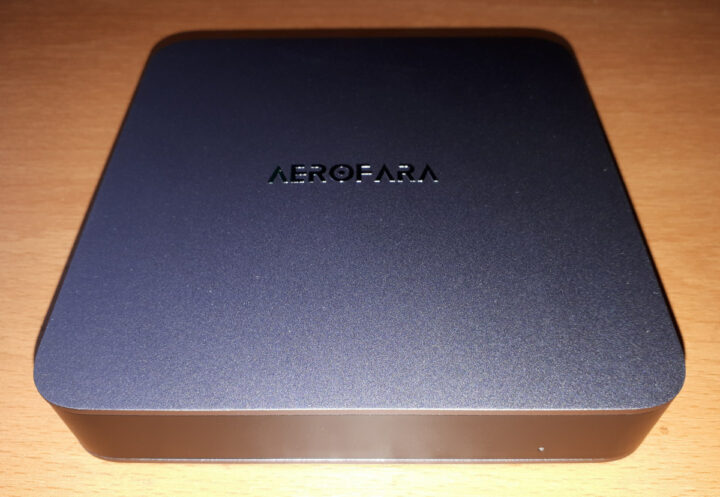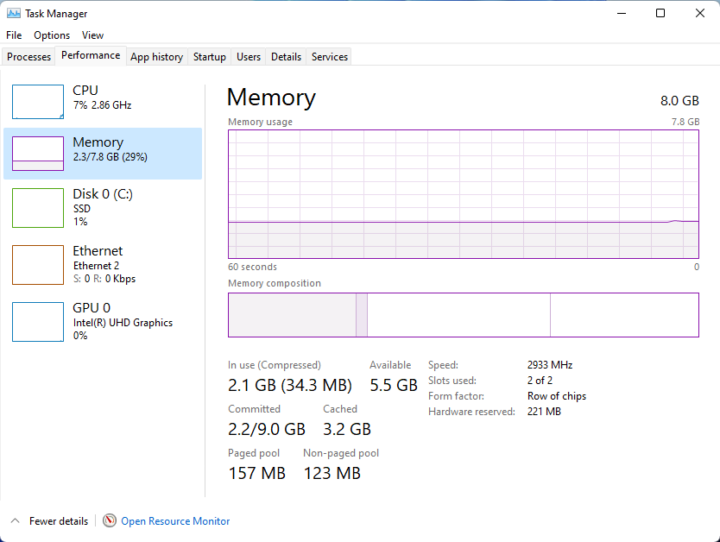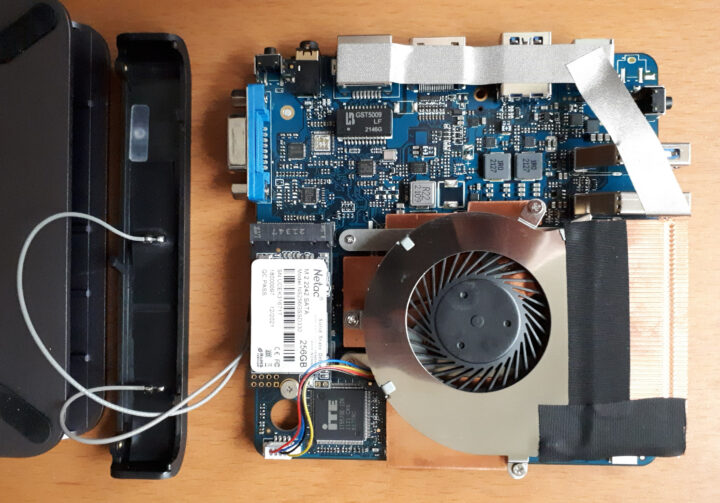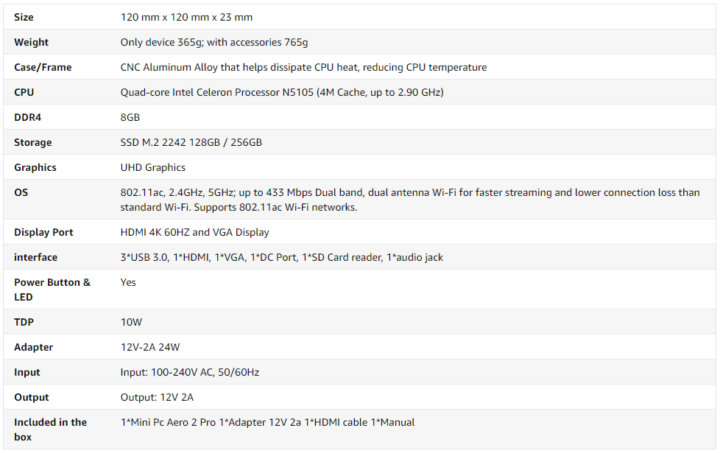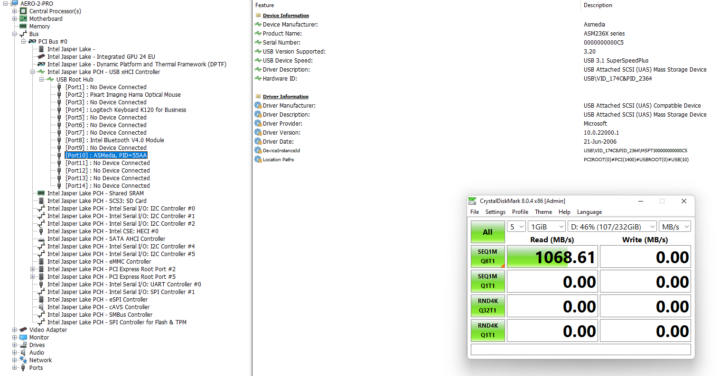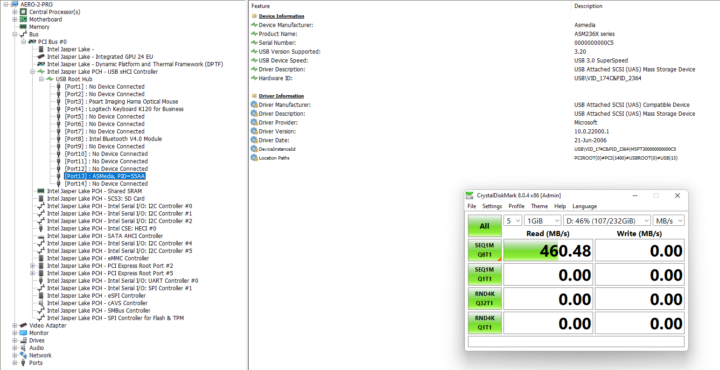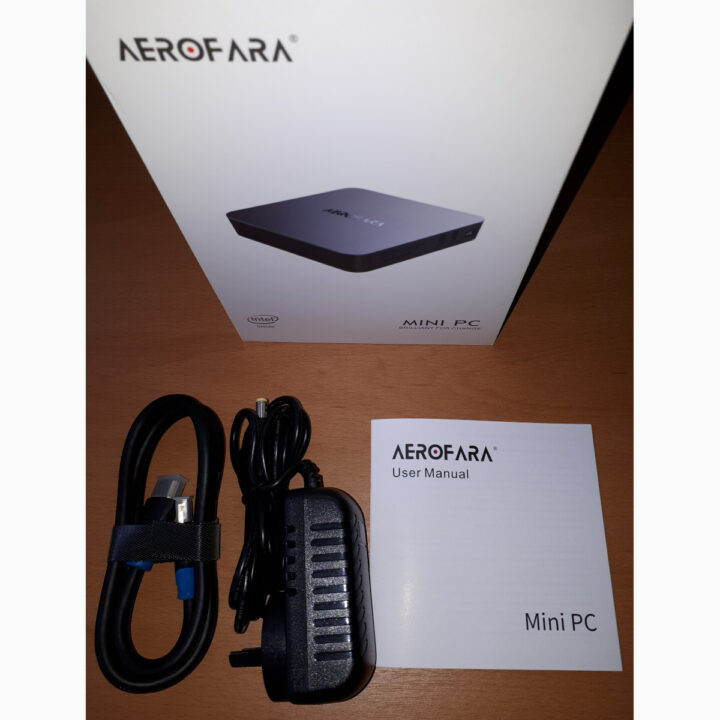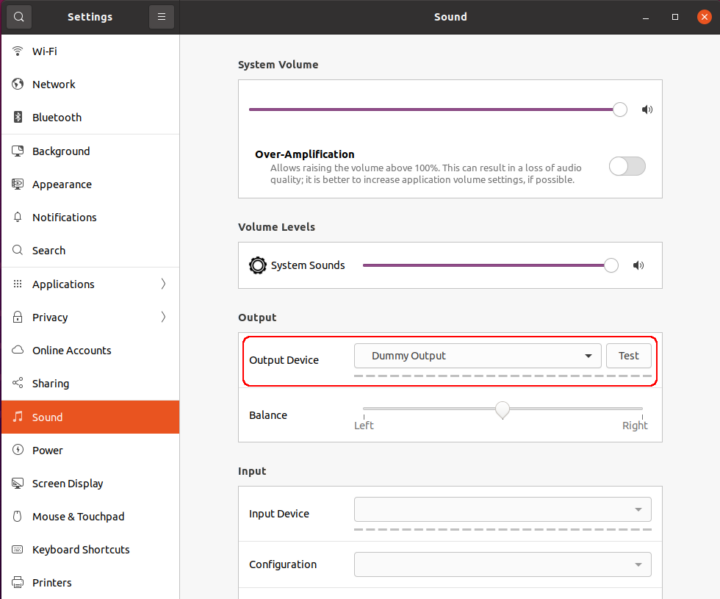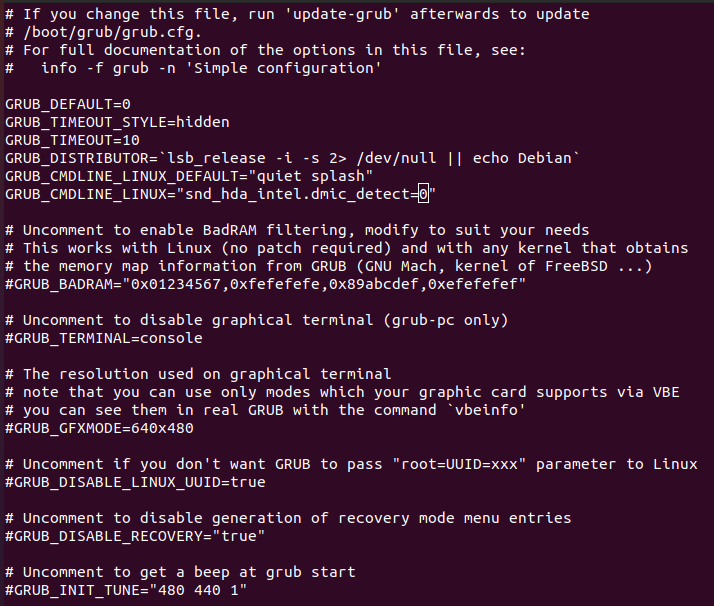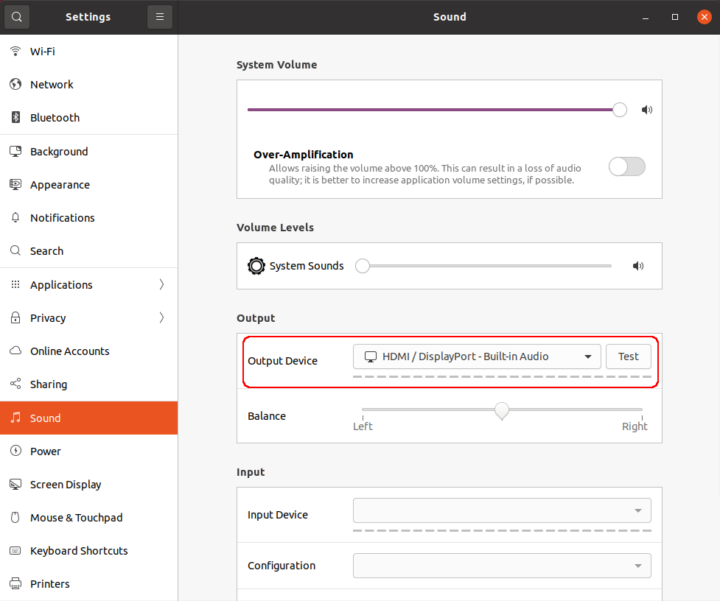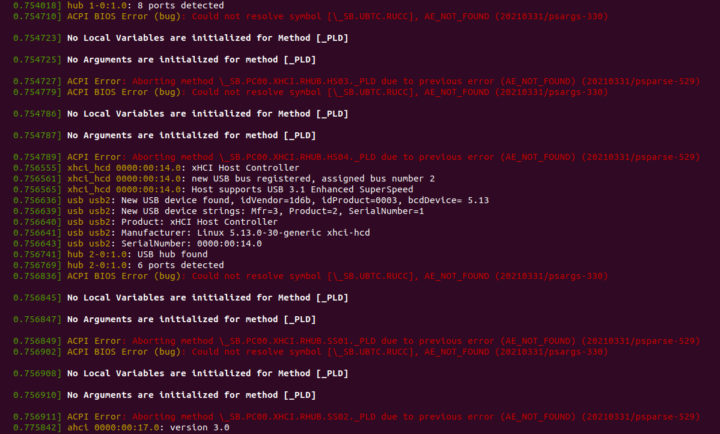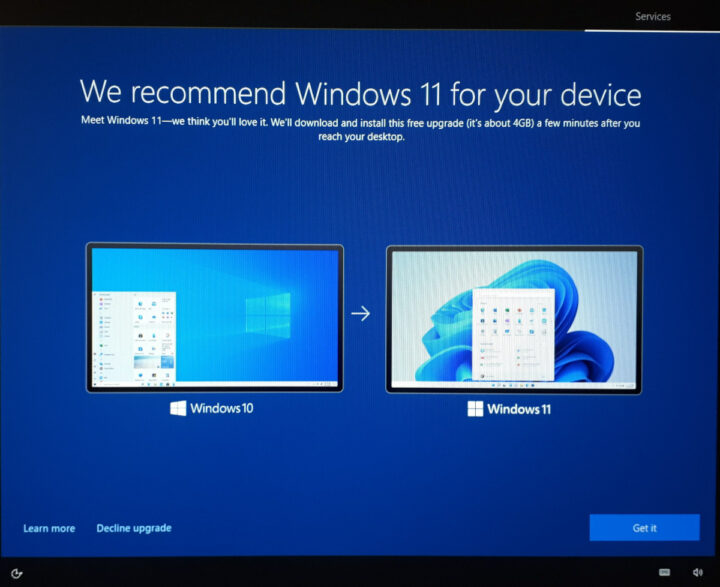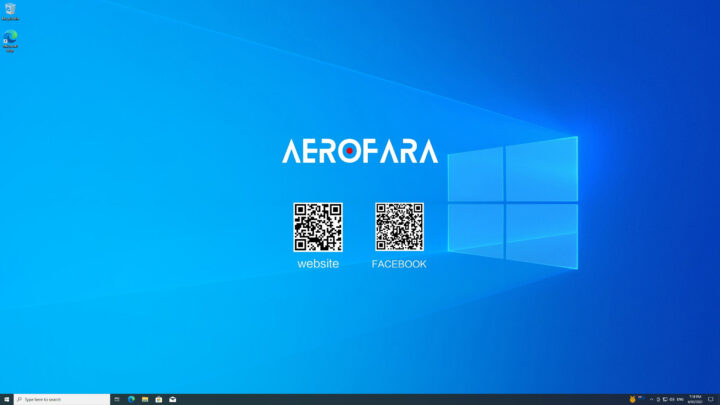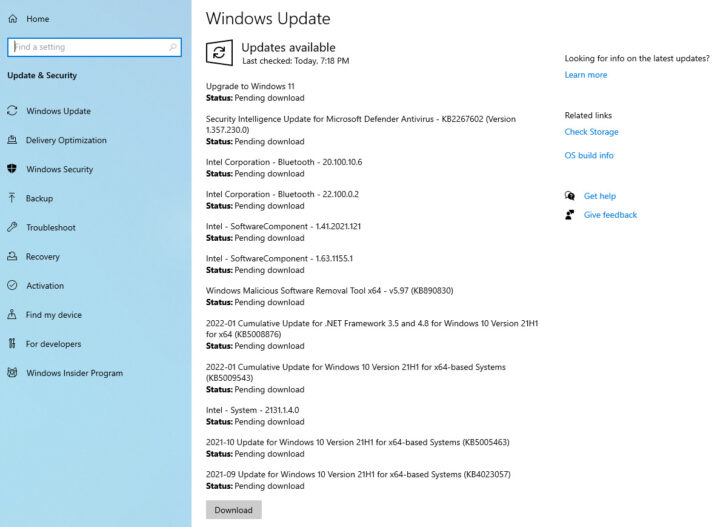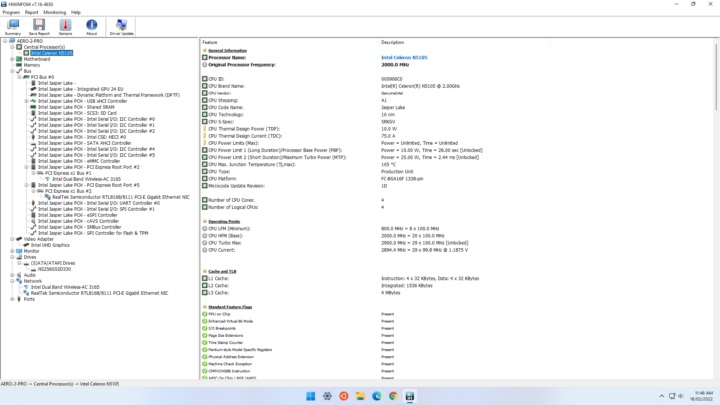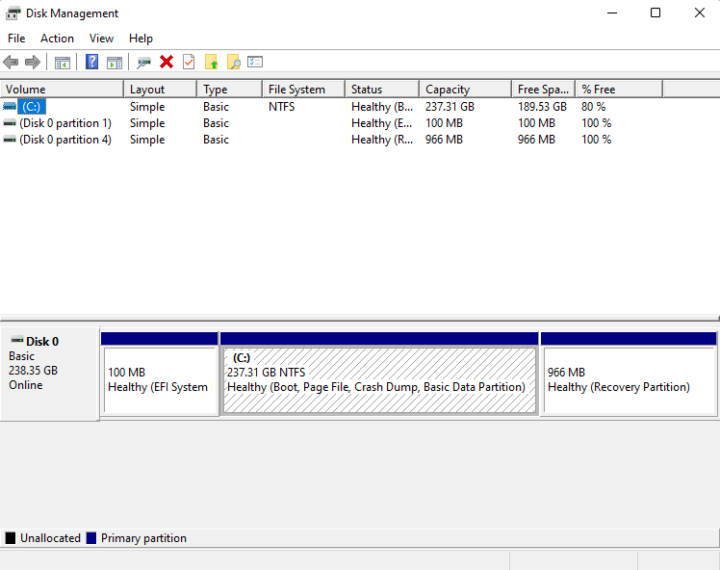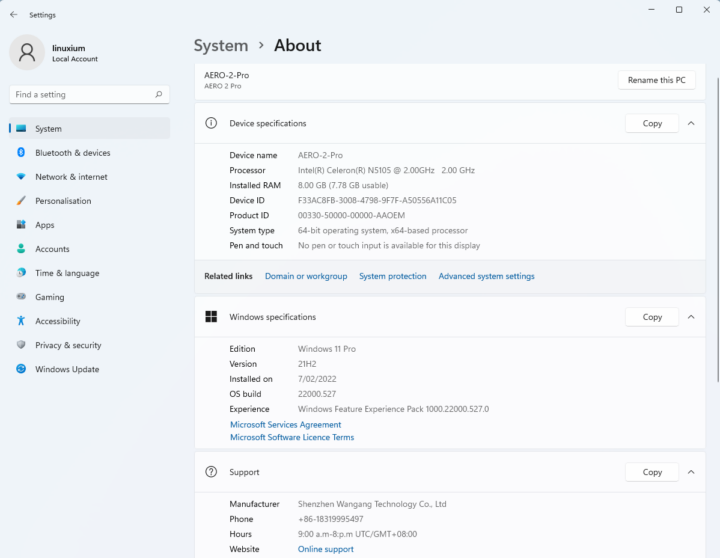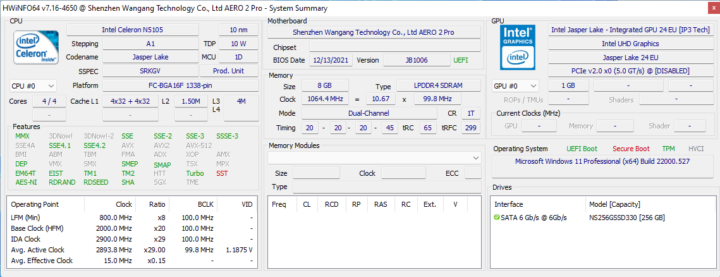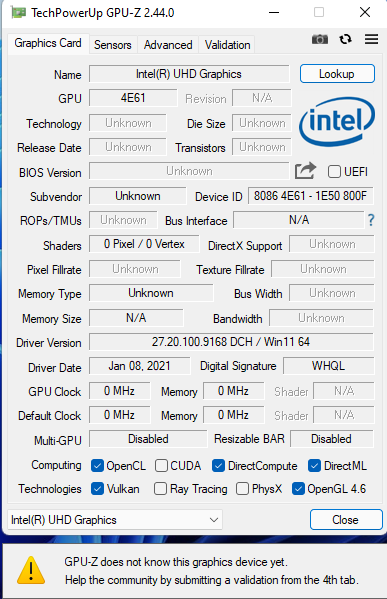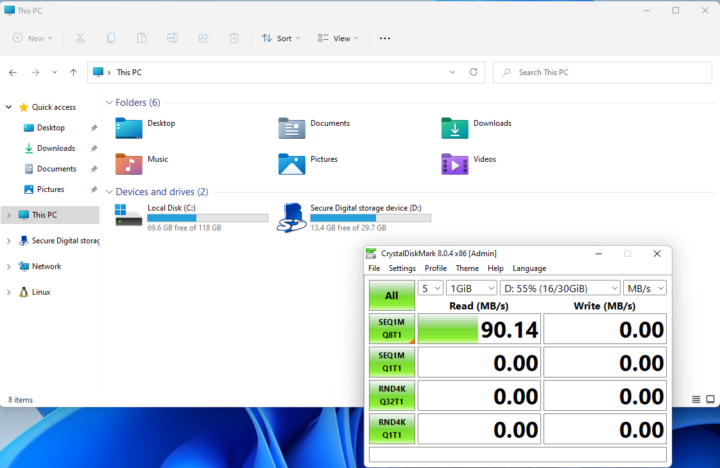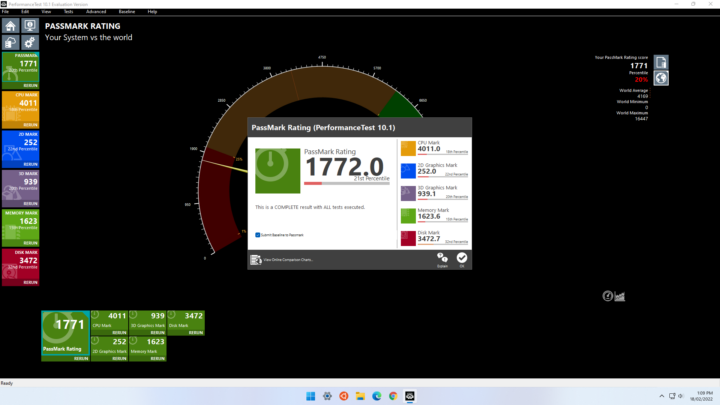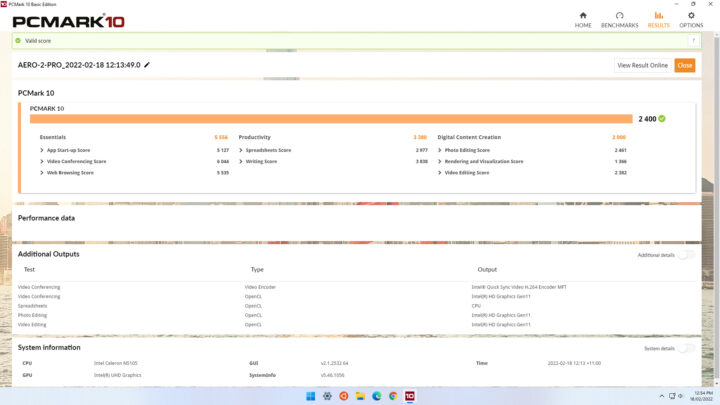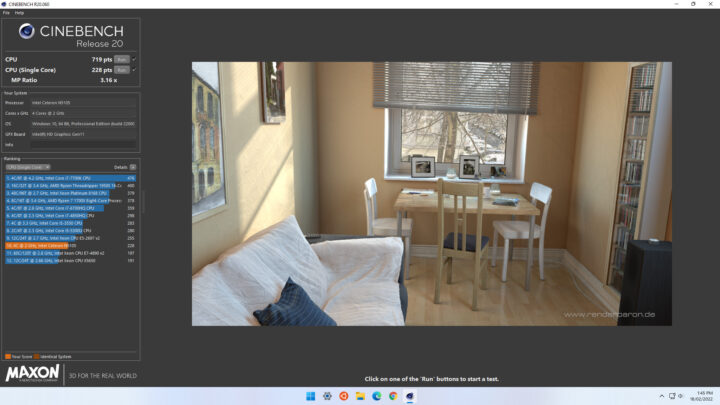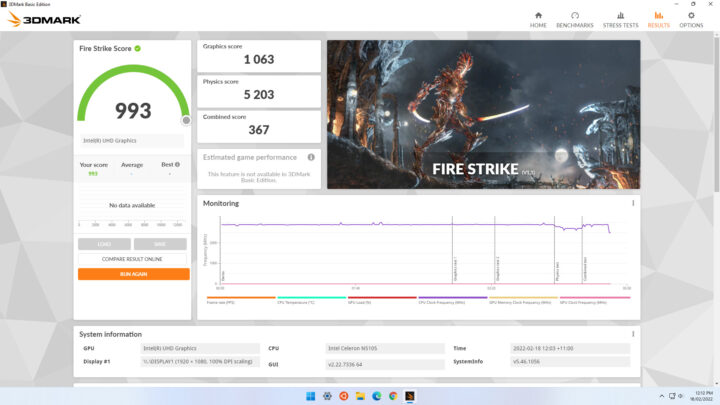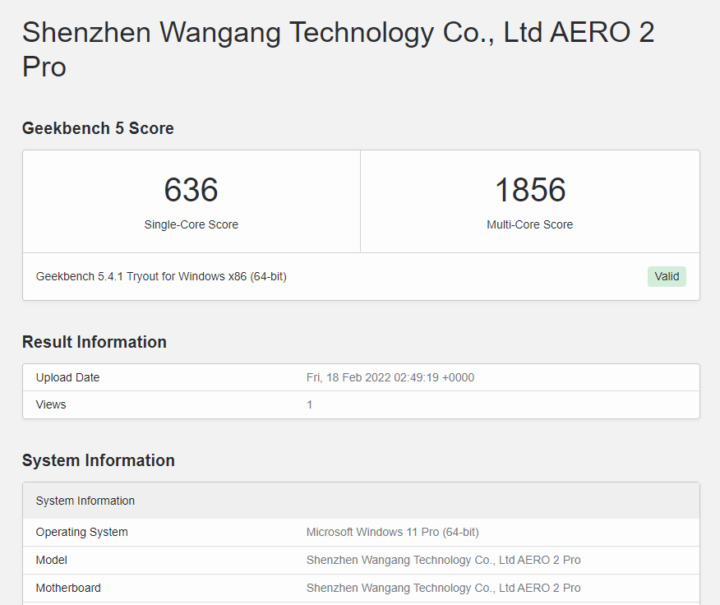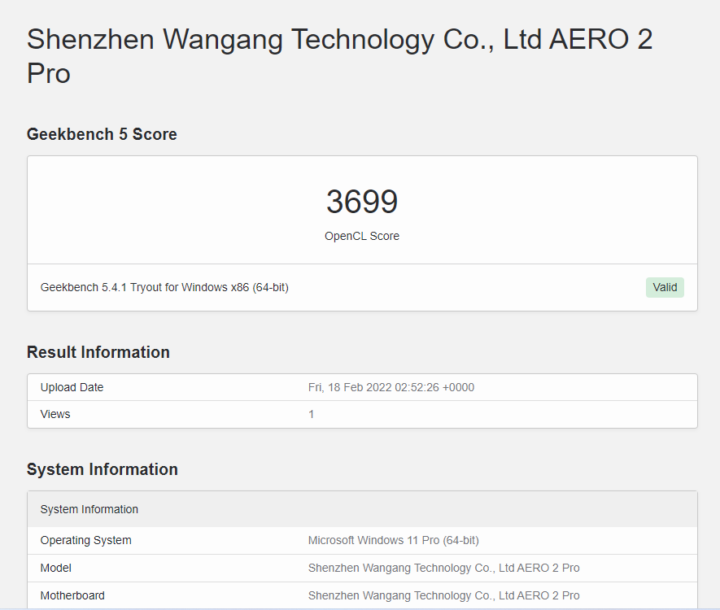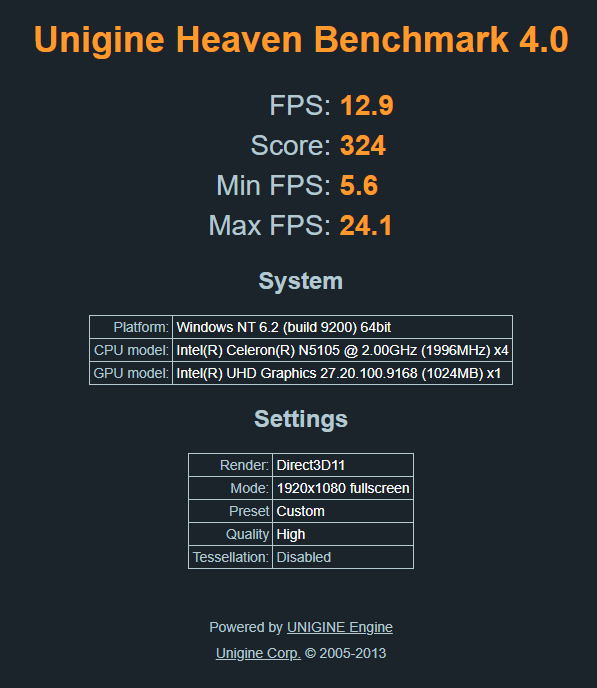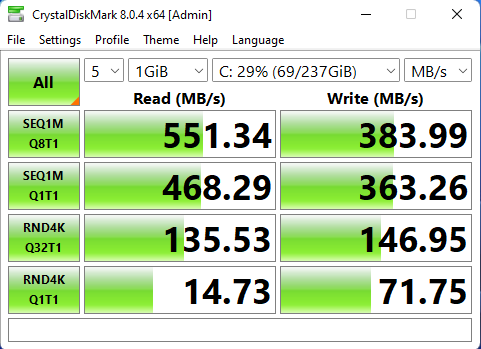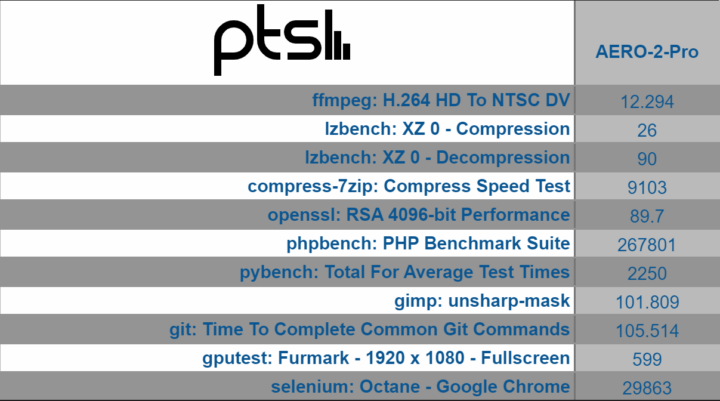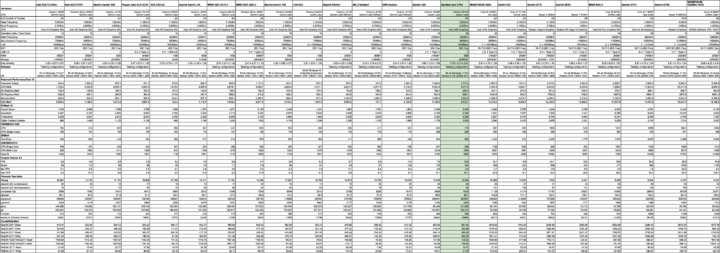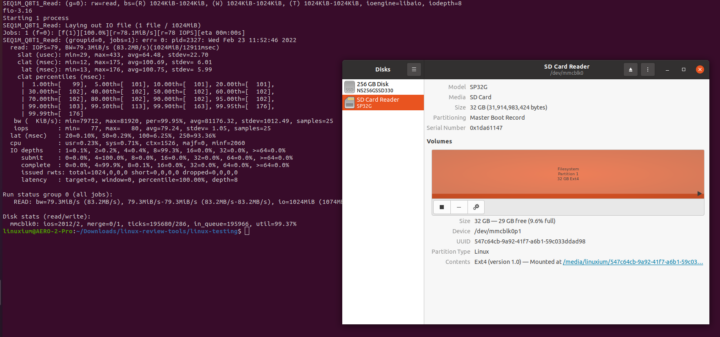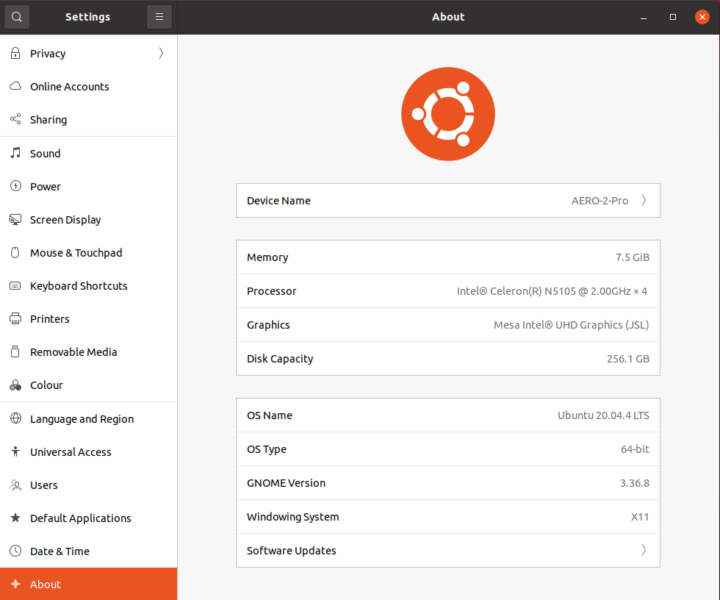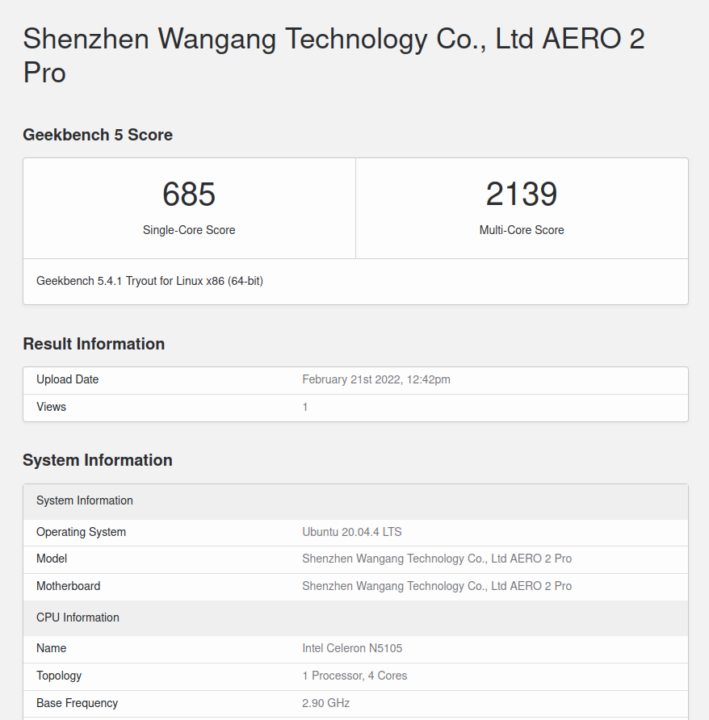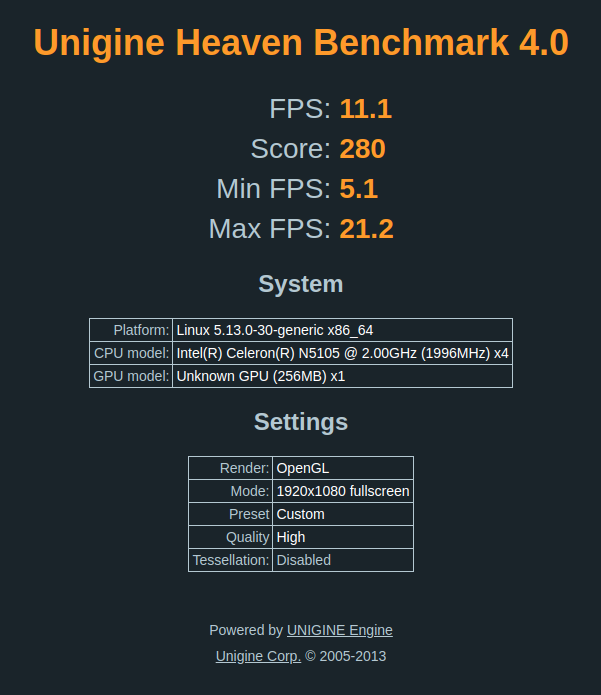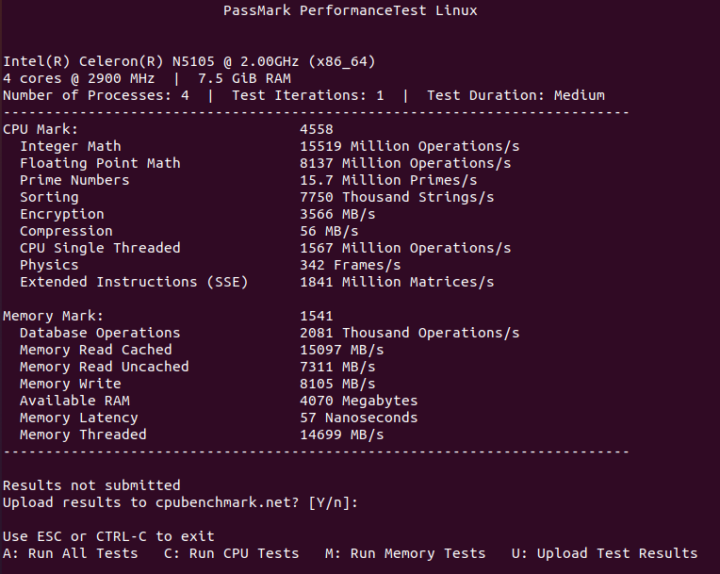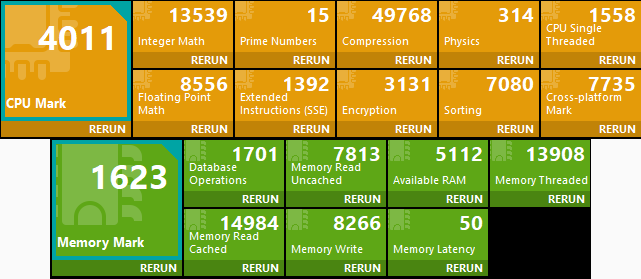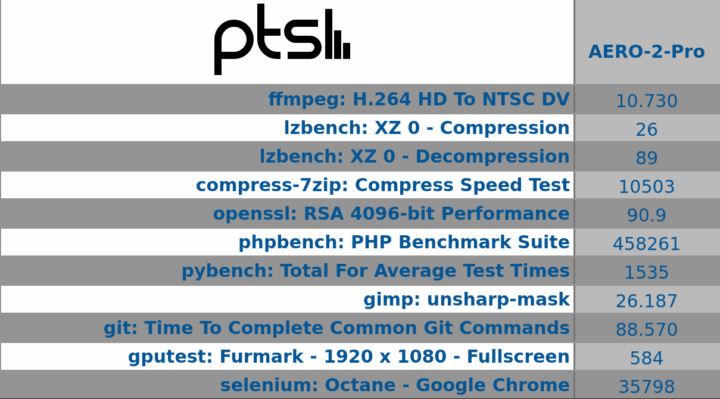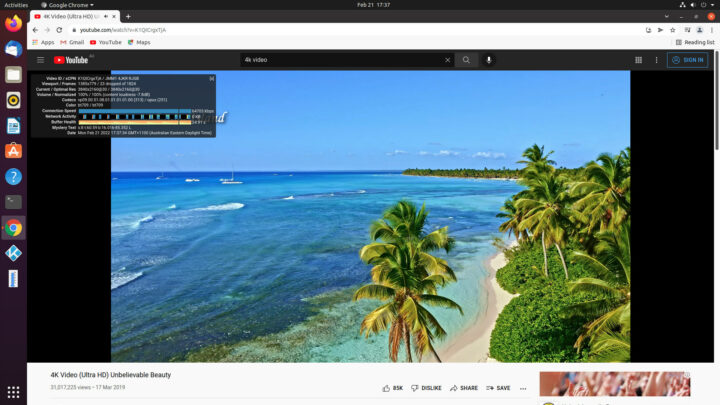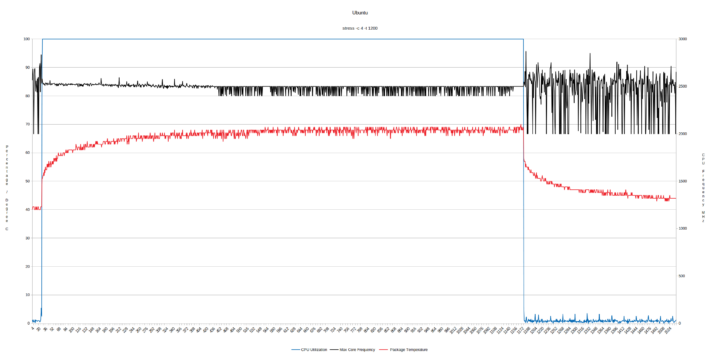Aerofara’s Aero 2 Pro is an Intel Jasper Lake mini PC and one of the very few new mini PCs to include a VGA port. Aerofara kindly sent one for review and I’ve looked at performance running both Windows and Ubuntu.
Aero 2 Pro Hardware Overview
The Aero 2 Pro physically consists of a 120 x 120 x 23mm (4.72 x 4.72 x 0.91 inches) rectangular metal case with inset front and back plastic panels. As an actively cooled mini PC, it uses Intel’s 10 nm Jasper Lake N5105 processor which is a quad-core 4-thread 2.00 GHz Celeron processor boosting to 2.90 GHz with Intel’s UHD Graphics.
The front panel is bereft of anything save a pinhole which is illuminated blue when the device is powered on. The rear panel includes the power jack, a USB 3.1 port, an HDMI port, an Ethernet port, a 3.5mm headphone jack, and a reset CMOS pinhole. The left side includes a VGA port and an air intake vent. Finally, the right side includes a full-sized SD card slot which is underneath a hot air exhaust vent, a USB 3.0 port, a further USB 3.1 port, and the power button.
Internally there is soldered-on 8GB DDR4 2933MHz memory operating in dual-channel:
and a soldered-on Intel Wireless-AC 3165 chip together with an M.2 2242 SATA drive (the review model included a 256GB Netac drive complete with Windows 10 Pro installed) and is accessed by removing the front and rear panels and then sliding out the motherboard from the aluminum case:
The specifications state:
and lists the three USB ports as 3.0 so I tested them using a Samsung 980 PRO PCle 4.0 NVMe M.2 SSD housed in an ‘USB to M.2 NVMe adapter’ (ORICO M2PAC3-G20 M.2 NVMe SSD Enclosure) which showed that the rear and second of the side USB ports were actually 3.1 (USB 3.2 Gen 2×1 i.e. 10 Gbit/s):
and only the first of the side USB ports was 3.0 (USB 3.2 Gen 1×1 i.e. 5 Gbit/s):
Box contents
In the box, you get a power adapter with a cord, an HDMI cable, and a multilingual user manual. Noticeably absent is a VESA mounting bracket and the device itself does not have any mounting screw holes.
Review Methodology
When reviewing mini PCs, I typically look at their performance under both Windows and Linux (Ubuntu) and compare them against some of the more recently released mini PCs. Where possible I review using Windows 11 version 21H2 and Ubuntu 20.04.3 LTS and test with a selection of commonly used Windows benchmarks and/or equivalents for Linux together with Thomas Kaiser’s ‘sbc-bench’ which is a small set of different CPU performance tests focusing on server performance when run on Ubuntu. I also use ‘Phoronix Test Suite’ and benchmark with the same set of tests on both Windows and Ubuntu for comparison purposes. On Ubuntu, I also compile the v5.4 Linux kernel using the default config as a test of performance using a real-world scenario.
Prior to benchmarking, I perform all necessary installations and updates to run the latest versions of both OSes. I also capture some basic details of the device for each OS.
Installation Issues
Running the benchmarks went smoothly with the exception of the ‘Selenium’ test from the ‘Phoronix Test Suite’. When running the test with ‘Chrome’ selected it errored with the message ‘The test quit with a non-zero exit status’. This is typically caused by the benchmark driver used by the test not supporting the newest Chrome release and has been encountered before. As a result, the Octane tests were run manually and edited into the final results.
On Ubuntu 20.04.3 there was no audio, neither from HDMI nor when attaching an external speaker or headphones to the 3.5mm audio jack:
and the ‘dmesg’ included errors:

HDMI audio could be successfully fixed by adding either ‘snd_hda_intel.dmic_detect=0’ or ‘snd_intel_dspcfg.dsp_driver=1’ as a GRUB2 kernel boot parameter:
however this did not resolve the headphone issue.
There are also some BIOS errors being reported in the ‘dmesg’ although the significance of which has not been determined:
Aero 2 Pro Windows Performance
Initially, the Aero 2 Pro came installed with a licensed copy of Windows 10 Pro version 21H1 build 19043.1083 and when booting Microsoft encourages you to upgrade to Windows 11:
Once booted, you are met with an Aerofara personalized desktop background:
Although I had previously selected Windows 11, it took some time before it was finally ready to install and upgrade as Windows first decided to apply all the outstanding Windows 10 updates:
Eventually, I was finally upgraded to Windows 11 Pro 21H2 build 22000.527 and a quick look at the hardware information showed it is aligned to the specification noting the USB bump above:
Similar to when I reviewed a mini PC with Intel’s Jasper Lake N5095 processor, the iGPU showed limited details in HWiNFO and was unknown to GPU-Z:
A brief check showed working audio, Wi-Fi, Bluetooth, and Ethernet. I also confirmed that the SD card was working as this could be used as a form of storage expansion albeit rather slow:
I then set the power mode to ‘High performance’ and ran my standard set of benchmarking tools to look at performance under Windows:
For my specific set of Phoronix Test Suite tests the results were:
All these results can then be compared with other recent mini PCs:
The iGPU results are significantly better as a result of the increased number of execution units.
Ubuntu Performance
After shrinking the Windows partition in half and creating a new partition, I installed Ubuntu 20.04.3 as dual boot. After installation, updates, and the fix mentioned above, a brief check showed working HDMI audio, Wi-Fi, Bluetooth, Ethernet but non-working headphone audio. I also confirmed that the SD card was working as this has previously been known to be problematic in Ubuntu on other mini PCs:
The key hardware information under Ubuntu 20.04.3 is as follows:
|
1 2 3 4 5 6 7 8 9 10 11 12 13 14 15 16 17 18 19 20 21 22 23 24 25 26 27 28 29 30 31 32 33 34 35 36 37 38 39 40 41 42 43 44 45 46 47 48 49 50 51 52 53 54 55 56 57 58 59 60 61 62 63 64 65 66 67 68 69 70 71 72 73 74 75 76 77 78 79 80 81 82 83 84 85 86 87 88 89 90 91 92 93 94 95 96 97 98 99 100 101 102 103 104 105 106 107 108 109 110 111 112 113 114 115 116 117 118 119 120 121 122 123 124 125 126 127 128 129 130 131 132 133 134 135 136 137 138 139 140 141 142 143 144 145 146 147 148 149 150 151 152 153 154 155 156 157 158 159 160 161 162 163 164 165 166 167 168 169 170 171 172 173 174 175 176 177 178 179 180 181 182 183 184 185 186 187 188 189 190 191 192 193 194 195 196 197 198 199 200 201 202 203 204 205 206 207 208 209 210 211 212 213 214 215 216 217 218 219 220 221 222 223 224 225 226 227 228 229 230 231 232 233 234 235 236 237 238 239 240 241 242 243 244 245 246 247 248 249 250 251 252 253 254 255 256 |
linuxium@AERO-2-Pro:~$ lsb_release -a Distributor ID: Ubuntu Description: Ubuntu 20.04.4 LTS Release: 20.04 Codename: focal linuxium@AERO-2-Pro:~$ linuxium@AERO-2-Pro:~$ uname -a Linux AERO-2-Pro 5.13.0-30-generic #33~20.04.1-Ubuntu SMP Mon Feb 7 14:25:10 UTC 2022 x86_64 x86_64 x86_64 GNU/Linux linuxium@AERO-2-Pro:~$ linuxium@AERO-2-Pro:~$ inxi -Fzc0 System: Kernel: 5.13.0-30-generic x86_64 bits: 64 Desktop: Gnome 3.36.9 Distro: Ubuntu 20.04.4 LTS (Focal Fossa) Machine: Type: Mini-pc Mobo: Shenzhen Wangang model: AERO 2 Pro serial: <filter> UEFI: American Megatrends LLC. v: JB1006 date: 12/13/2021 CPU: Topology: Quad Core model: Intel Celeron N5105 bits: 64 type: MCP L2 cache: 4096 KiB Speed: 2062 MHz min/max: 800/2900 MHz Core speeds (MHz): 1: 2062 2: 2899 3: 2866 4: 2267 Graphics: Device-1: Intel driver: i915 v: kernel Display: server: X.Org 1.20.13 driver: i915 resolution: 1920x1080~60Hz OpenGL: renderer: Mesa Intel UHD Graphics (JSL) v: 4.6 Mesa 21.2.6 Audio: Device-1: Intel driver: sof-audio-pci-intel-icl Sound Server: ALSA v: k5.13.0-30-generic Network: Device-1: Intel Wireless 3165 driver: iwlwifi IF: wlp1s0 state: down mac: <filter> Device-2: Realtek RTL8111/8168/8411 PCI Express Gigabit Ethernet driver: r8169 IF: enp2s0 state: up speed: 1000 Mbps duplex: full mac: <filter> Drives: Local Storage: total: 238.47 GiB used: 21.56 GiB (9.0%) ID-1: /dev/sda model: NS256GSSD330 size: 238.47 GiB Partition: ID-1: / size: 116.29 GiB used: 21.53 GiB (18.5%) fs: ext4 dev: /dev/sda5 Sensors: System Temperatures: cpu: 36.0 C mobo: N/A Fan Speeds (RPM): N/A Info: Processes: 217 Uptime: 17m Memory: 7.55 GiB used: 774.0 MiB (10.0%) Shell: new-review-test inxi: 3.0.38 linuxium@AERO-2-Pro:~$ linuxium@AERO-2-Pro:~$ df -h Filesystem Size Used Avail Use% Mounted on udev 3.8G 0 3.8G 0% /dev tmpfs 773M 1.8M 772M 1% /run /dev/sda5 117G 22G 89G 20% / tmpfs 3.8G 0 3.8G 0% /dev/shm tmpfs 5.0M 0 5.0M 0% /run/lock tmpfs 3.8G 0 3.8G 0% /sys/fs/cgroup /dev/loop0 56M 56M 0 100% /snap/core18/2128 /dev/loop1 56M 56M 0 100% /snap/core18/2284 /dev/loop2 128K 128K 0 100% /snap/bare/5 /dev/loop3 66M 66M 0 100% /snap/gtk-common-themes/1515 /dev/loop5 66M 66M 0 100% /snap/gtk-common-themes/1519 /dev/loop4 219M 219M 0 100% /snap/gnome-3-34-1804/77 /dev/loop6 44M 44M 0 100% /snap/snapd/14978 /dev/loop7 55M 55M 0 100% /snap/snap-store/558 /dev/loop8 62M 62M 0 100% /snap/core20/1328 /dev/loop9 249M 249M 0 100% /snap/gnome-3-38-2004/99 /dev/loop10 51M 51M 0 100% /snap/snap-store/547 /dev/loop11 219M 219M 0 100% /snap/gnome-3-34-1804/72 /dev/sda1 96M 33M 64M 34% /boot/efi tmpfs 773M 24K 773M 1% /run/user/1000 linuxium@AERO-2-Pro:~$ linuxium@AERO-2-Pro:~$ lsblk -a NAME MAJ:MIN RM SIZE RO TYPE MOUNTPOINT loop0 7:0 0 55.4M 1 loop /snap/core18/2128 loop1 7:1 0 55.5M 1 loop /snap/core18/2284 loop2 7:2 0 4K 1 loop /snap/bare/5 loop3 7:3 0 65.1M 1 loop /snap/gtk-common-themes/1515 loop4 7:4 0 219M 1 loop /snap/gnome-3-34-1804/77 loop5 7:5 0 65.2M 1 loop /snap/gtk-common-themes/1519 loop6 7:6 0 43.6M 1 loop /snap/snapd/14978 loop7 7:7 0 54.2M 1 loop /snap/snap-store/558 loop8 7:8 0 61.9M 1 loop /snap/core20/1328 loop9 7:9 0 248.8M 1 loop /snap/gnome-3-38-2004/99 loop10 7:10 0 51M 1 loop /snap/snap-store/547 loop11 7:11 0 219M 1 loop /snap/gnome-3-34-1804/72 loop12 7:12 0 0 loop sda 8:0 0 238.5G 0 disk ├─sda1 8:1 0 100M 0 part /boot/efi ├─sda2 8:2 0 128M 0 part ├─sda3 8:3 0 118.7G 0 part ├─sda4 8:4 0 966M 0 part └─sda5 8:5 0 118.7G 0 part / linuxium@AERO-2-Pro:~$ linuxium@AERO-2-Pro:~$ sudo lshw -C cpu *-cpu description: CPU product: Intel(R) Celeron(R) N5105 @ 2.00GHz vendor: Intel Corp. physical id: 12 bus info: cpu@0 version: Intel(R) Celeron(R) N5105 @ 2.00GHz serial: <filter> slot: U3E1 size: 1146MHz capacity: 2900MHz width: 64 bits clock: 100MHz capabilities: lm fpu fpu_exception wp vme de pse tsc msr pae mce cx8 apic sep mtrr pge mca cmov pat pse36 clflush dts acpi mmx fxsr sse sse2 ss ht tm pbe syscall nx rdtscp x86-64 constant_tsc art arch_perfmon pebs bts rep_good nopl xtopology nonstop_tsc cpuid aperfmperf tsc_known_freq pni pclmulqdq dtes64 monitor ds_cpl vmx est tm2 ssse3 sdbg cx16 xtpr pdcm sse4_1 sse4_2 x2apic movbe popcnt tsc_deadline_timer aes xsave rdrand lahf_lm 3dnowprefetch cpuid_fault epb cat_l2 cdp_l2 ssbd ibrs ibpb stibp ibrs_enhanced tpr_shadow vnmi flexpriority ept vpid ept_ad fsgsbase tsc_adjust smep erms rdt_a rdseed smap clflushopt clwb intel_pt sha_ni xsaveopt xsavec xgetbv1 xsaves split_lock_detect dtherm ida arat pln pts hwp hwp_notify hwp_act_window hwp_epp hwp_pkg_req umip waitpkg gfni rdpid movdiri movdir64b md_clear flush_l1d arch_capabilities cpufreq configuration: cores=4 enabledcores=4 threads=4 linuxium@AERO-2-Pro:~$ linuxium@AERO-2-Pro:~$ sudo lshw -C memory *-firmware description: BIOS vendor: American Megatrends International, LLC. physical id: 0 version: JB1006 date: 12/13/2021 size: 64KiB capacity: 8MiB capabilities: pci upgrade shadowing cdboot bootselect socketedrom edd int13floppy1200 int13floppy720 int13floppy2880 int5printscreen int14serial int17printer acpi usb biosbootspecification uefi *-memory description: System Memory physical id: 6 slot: System board or motherboard size: 8GiB *-bank:0 description: Row of chips LPDDR4 Synchronous 3733 MHz (0.3 ns) vendor: Samsung physical id: 0 serial: <filter> slot: Controller0-ChannelA size: 4GiB width: 32 bits clock: 3733MHz (0.3ns) *-bank:1 description: Row of chips LPDDR4 Synchronous 3733 MHz (0.3 ns) vendor: Samsung physical id: 1 serial: <filter> slot: Controller0-ChannelB size: 4GiB width: 32 bits clock: 3733MHz (0.3ns) *-cache:0 description: L1 cache physical id: f slot: L1 Cache size: 256KiB capacity: 256KiB capabilities: synchronous internal write-back configuration: level=1 *-cache:1 description: L2 cache physical id: 10 slot: L2 Cache size: 6MiB capacity: 6MiB capabilities: synchronous internal write-back unified configuration: level=2 *-cache:2 description: L3 cache physical id: 11 slot: L3 Cache size: 4MiB capacity: 4MiB capabilities: synchronous internal write-back unified configuration: level=3 *-memory UNCLAIMED description: RAM memory product: Intel Corporation vendor: Intel Corporation physical id: 14.2 bus info: pci@0000:00:14.2 version: 01 width: 64 bits clock: 33MHz (30.3ns) capabilities: pm cap_list configuration: latency=0 resources: iomemory:600-5ff iomemory:600-5ff memory:6001124000-6001125fff memory:6001131000-6001131fff linuxium@AERO-2-Pro:~$ linuxium@AERO-2-Pro:~$ free -mh total used free shared buff/cache available Mem: 7.5Gi 680Mi 5.7Gi 186Mi 1.2Gi 6.5Gi Swap: 2.0Gi 0B 2.0Gi linuxium@AERO-2-Pro:~$ linuxium@AERO-2-Pro:~$ sudo lshw -C network *-network description: Wireless interface product: Wireless 3165 vendor: Intel Corporation physical id: 0 bus info: pci@0000:01:00.0 logical name: wlp1s0 version: 91 serial: <filter> width: 64 bits clock: 33MHz capabilities: pm msi pciexpress bus_master cap_list ethernet physical wireless configuration: broadcast=yes driver=iwlwifi driverversion=5.13.0-30-generic firmware=29.1654887522.0 7265D-29.ucode latency=0 link=no multicast=yes wireless=IEEE 802.11 resources: irq:129 memory:7fd00000-7fd01fff *-network description: Ethernet interface product: RTL8111/8168/8411 PCI Express Gigabit Ethernet Controller vendor: Realtek Semiconductor Co., Ltd. physical id: 0 bus info: pci@0000:02:00.0 logical name: enp2s0 version: 15 serial: <filter> size: 1Gbit/s capacity: 1Gbit/s width: 64 bits clock: 33MHz capabilities: pm msi pciexpress msix bus_master cap_list ethernet physical tp mii 10bt 10bt-fd 100bt 100bt-fd 1000bt-fd autonegotiation configuration: autonegotiation=on broadcast=yes driver=r8169 driverversion=5.13.0-30-generic duplex=full firmware=rtl8168h-2_0.0.2 02/26/15 ip=<filter> latency=0 link=yes multicast=yes port=twisted pair speed=1Gbit/s resources: irq:16 ioport:3000(size=256) memory:7fc04000-7fc04fff memory:7fc00000-7fc03fff linuxium@AERO-2-Pro:~$ linuxium@AERO-2-Pro:~$ sudo lshw -C display *-display description: VGA compatible controller product: Intel Corporation vendor: Intel Corporation physical id: 2 bus info: pci@0000:00:02.0 logical name: /dev/fb0 version: 01 width: 64 bits clock: 33MHz capabilities: pciexpress msi pm vga_controller bus_master cap_list fb configuration: depth=32 driver=i915 latency=0 mode=2560x1080 visual=truecolor xres=2560 yres=1080 resources: iomemory:600-5ff iomemory:400-3ff irq:130 memory:6000000000-6000ffffff memory:4000000000-400fffffff ioport:4000(size=64) memory:c0000-dffff linuxium@AERO-2-Pro:~$ linuxium@AERO-2-Pro:~$ dmesg | grep -i sdhci [ 0.796292] sdhci: Secure Digital Host Controller Interface driver [ 0.796294] sdhci: Copyright(c) Pierre Ossman [ 0.799592] sdhci-pci 0000:00:14.5: SDHCI controller found [8086:4df8] (rev 1) [ 0.812526] mmc0: SDHCI controller on PCI [0000:00:14.5] using ADMA 64-bit [ 0.812573] sdhci-pci 0000:00:1a.0: SDHCI controller found [8086:4dc4] (rev 1) [ 0.813260] mmc1: SDHCI controller on PCI [0000:00:1a.0] using ADMA 64-bit linuxium@AERO-2-Pro:~$ linuxium@AERO-2-Pro:~$ lsusb Bus 002 Device 001: ID 1d6b:0003 Linux Foundation 3.0 root hub Bus 001 Device 004: ID 8087:0a2a Intel Corp. Bus 001 Device 003: ID 046d:c31c Logitech, Inc. Keyboard K120 Bus 001 Device 002: ID 093a:2510 Pixart Imaging, Inc. Optical Mouse Bus 001 Device 001: ID 1d6b:0002 Linux Foundation 2.0 root hub linuxium@AERO-2-Pro:~$ linuxium@AERO-2-Pro:~$ lspci -nn 00:00.0 Host bridge [0600]: Intel Corporation Device [8086:4e24] 00:02.0 VGA compatible controller [0300]: Intel Corporation Device [8086:4e61] (rev 01) 00:04.0 Signal processing controller [1180]: Intel Corporation Device [8086:4e03] 00:14.0 USB controller [0c03]: Intel Corporation Device [8086:4ded] (rev 01) 00:14.2 RAM memory [0500]: Intel Corporation Device [8086:4def] (rev 01) 00:14.5 SD Host controller [0805]: Intel Corporation Device [8086:4df8] (rev 01) 00:15.0 Serial bus controller [0c80]: Intel Corporation Device [8086:4de8] (rev 01) 00:15.1 Serial bus controller [0c80]: Intel Corporation Device [8086:4de9] (rev 01) 00:15.2 Serial bus controller [0c80]: Intel Corporation Device [8086:4dea] (rev 01) 00:16.0 Communication controller [0780]: Intel Corporation Device [8086:4de0] (rev 01) 00:17.0 SATA controller [0106]: Intel Corporation Device [8086:4dd3] (rev 01) 00:19.0 Serial bus controller [0c80]: Intel Corporation Device [8086:4dc5] (rev 01) 00:19.1 Serial bus controller [0c80]: Intel Corporation Device [8086:4dc6] (rev 01) 00:1a.0 SD Host controller [0805]: Intel Corporation Device [8086:4dc4] (rev 01) 00:1c.0 PCI bridge [0604]: Intel Corporation Device [8086:4db9] (rev 01) 00:1c.4 PCI bridge [0604]: Intel Corporation Device [8086:4dbc] (rev 01) 00:1e.0 Communication controller [0780]: Intel Corporation Device [8086:4da8] (rev 01) 00:1e.3 Serial bus controller [0c80]: Intel Corporation Device [8086:4dab] (rev 01) 00:1f.0 ISA bridge [0601]: Intel Corporation Device [8086:4d87] (rev 01) 00:1f.3 Multimedia audio controller [0401]: Intel Corporation Device [8086:4dc8] (rev 01) 00:1f.4 SMBus [0c05]: Intel Corporation Device [8086:4da3] (rev 01) 00:1f.5 Serial bus controller [0c80]: Intel Corporation Device [8086:4da4] (rev 01) 01:00.0 Network controller [0280]: Intel Corporation Wireless 3165 [8086:3165] (rev 91) 02:00.0 Ethernet controller [0200]: Realtek Semiconductor Co., Ltd. RTL8111/8168/8411 PCI Express Gigabit Ethernet Controller [10ec:8168] (rev 15) linuxium@AERO-2-Pro:~$ |
I then set the CPU Scaling Governor to ‘performance’ and ran my Linux benchmarks for which the majority of the results are text-based but the graphical ones included:
I also ran PassMark PerformanceTest Linux:
which similarly can be directly compared to the results from when it was run on Windows:
For the same set of Phoronix Test Suite tests the results were:
The complete results together with a comparison against other recent mini PCs are:
Video playback in browsers & Kodi
Video playback was good however whilst the iGPU on Jasper Lake supports hardware decoding of VP9 and HEVC, unfortunately, AV1 is not supported. So when Edge uses AV1 decoding rather than VP9 the playback typically results in frames being dropped:
On Windows with VP9, both Edge and Chrome only very occasionally dropped frames with 4K 60 FPS videos with 4K 30 FPS playing perfectly.
However on Ubuntu both Firefox and Chrome continuously stalled while playing 4K 60 FPS videos and required 1440p to just occasionally drop frames:
4K 30 FPS videos also dropped the occasional frame with Chrome again being slightly worse than Firefox:
Finally, I played some videos in Kodi of various formats all of which played without issue until I tried 8K 60 FPS which resulted in some frame skipping and stuttering.
Aero 2 Pro mini PC’s thermals
The Aero 2 Pro uses active cooling and running a stress test on Ubuntu saw the CPU temperature rise to a peak of 70°C with an average around 68°C for the latter duration of the test:
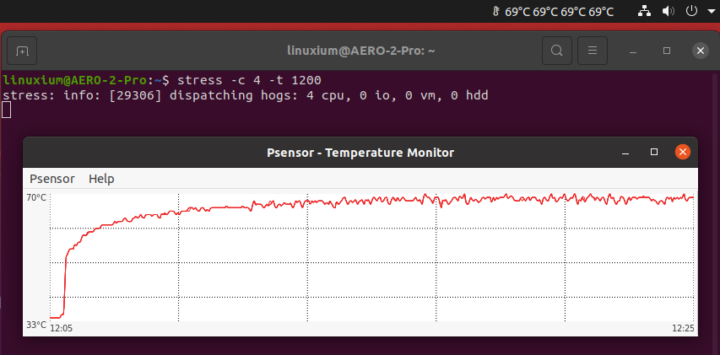
During the stress test at an ambient room temperature of 25.4°C, the top of the device did not get hot to touch and measured 37.6°C. With the device under load the fan is audible and measured around 41 dBA on my sound meter next to the device compared to 36 dBA at idle.
If the CPU frequency is monitored during the stress test it can be seen that during the first part of the test whilst the temperature was climbing it averaged 2515 MHz which then dropped slightly to an average of 2476 MHz for the remaining duration of the test:
Networking
Network connectivity throughput was measured on Ubuntu using ‘iperf’:
Power consumption
The power consumption was measured as follows:
- Powered off (shutdown) – 0.0 Watts
- BIOS* – 10.2 Watts
- GRUB boot menu – 9.6 Watts
- Idle – 9.8 Watts (Windows) and 4.5 Watts (Ubuntu)
- CPU stressed – 18.2 Watts (Windows ‘cinebench’) and 16.5 Watts (Ubuntu ‘stress’)
- Video playback** – 18.2 Watts (Windows Edge 4K 60 FPS) and 16.2 Watts (Ubuntu Chrome 1440p 60 FPS)
*BIOS (see below)
**The power figures fluctuate so the value is the average of the median high and median low power readings.
Aero 2 Pro BIOS
Powering up the mini PC and hitting the F7 key results in a boot menu that includes access to the BIOS. The BIOS is extremely restricted and contains only a single configurable option ‘S5 RTC Wake Settings’ which is disabled by default.
Final Observations
We’ve already seen that Jasper Lake offers improved CPU performance over Gemini Lake and earlier processors. The Aero 2 Pro’s N5101 Jasper Lake processor uses a slightly more powerful Intel UHD Graphics iGPU which ups the number of execution units resulting in significantly improved graphical performance compared to the N5095.
The inclusion of a VGA port, perhaps at the cost of an extra USB, HDMI, or Ethernet port, may be useful for both home and commercial usage, for example in connecting peripherals like projectors, however the lack of a VESA mount may be an issue for some. The fact that the BIOS does not include a ‘Power On’ setting suggests that ease of access to the device was assumed.
| Highlights | Limitations |
|---|---|
| Generational improvement of CPU and iGPU | No BIOS setting for ‘Power On’ |
| VGA port | Lack of VESA mount |
| SD card for storage expandability | Headphones not working in Ubuntu |
I’d like to thank Aerofara for providing the Aero 2 Pro for review. It is available from Amazon starting at $249 and $269 for the current (8GB/256GB) configuration.

Ian is interested in mini PCs and helps with reviews of mini PCs running Windows, Ubuntu and other Linux operating systems. You can follow him on Facebook or Twitter.
Support CNX Software! Donate via cryptocurrencies, become a Patron on Patreon, or purchase goods on Amazon or Aliexpress


